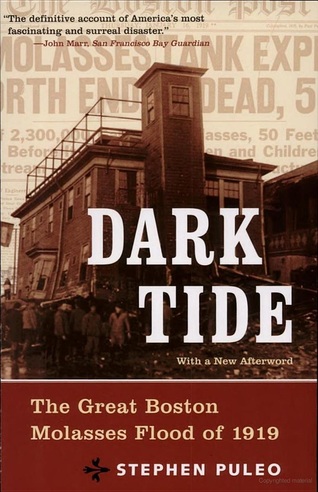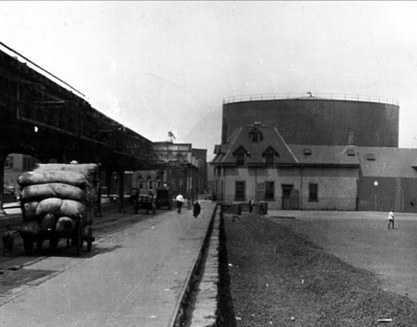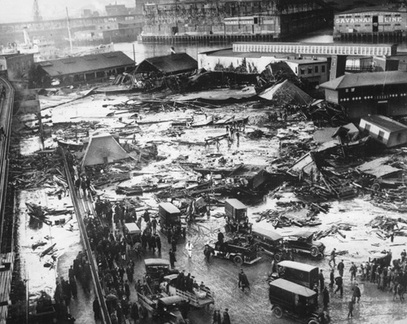DARK TIDE: The Great Boston Molasses Flood of 1919 by Stephen Puleo - an excerpt

BOOK JACKET
"Shortly after noon on January 15, 1919, a 50-foot-tall steel tank filled with 2.3 million gallons of molasses collapsed on Boston’s waterfront, disgorging its contents in a 15-foot-high wave of molasses that traveled at 35 miles per hour. The Great Boston Molasses Flood claimed the lives of 21 people and caused widespread destruction. For the first time, the story of the flood is told here in its full historical context, from the tank’s construction in 1915 through the multi-year lawsuit that followed the disaster. Dark Tide uses the gripping drama of the flood to examine the sweeping changes brought about by World War I, Prohibition, the anarchist movement (Sacco and Vanzetti murder trials), immigration, and the expanding role of big business in society. It’s also a chronicle of the courage of ordinary people, from the firemen caught in an unimaginable catastrophe to the soldier-lawyer who presided over the lawsuit with heroic impartiality."
EXCERPT
"Finally, and most importantly, the molasses flood and the court decision that followed marked a symbolic turning point the country's attitudes toward Big Business, which for most of the first quarter of the twentieth century had been subjected to few regulations to safeguard the public (government mandates during the First World War dealt more with taxation and production quotas than worker or public safety issues). Damon Hall noted in his closing argument: "When this tank was built, the first rush of the war was on, the opportunity was open to American contractors to make big money, and so they (USIA - United States Industrial Alcohol) said, 'to hell with the public, give us the tank.'"
"After the molasses hearings, despite continued economic prosperity and a strong pro-business attitude in Washington, the public began to fight back. Hugh Ogden's strong language and clear verdict against USIA in 1925 showed that the country had come a long way in ten years; a corporation could be made to pay for wanton negligence of the sort that led to the construction, with virtually no oversight or testing, of a monstrous tank capable of holding 26 million pounds of molasses in a congested neighborhood."
AcornNancy's thoughts:
Author Stephen Puleo graduated from Burlington High School, Burlington MA a few years before I did. My mother knows his parents and told me about this book. After reading it through in two days, I read it again... and again a year later. I was entranced, not only by the astonishing event itself, but the colorful urgency of Mr. Puleo's writing; I could almost smell the molasses! As far as I know, this is the only book ever written on this event. This book has been a catalyst for me falling in love with history and its connections to life in all directions, into all the nooks and crannies of who we are and how we made it to the 21st century.
"Shortly after noon on January 15, 1919, a 50-foot-tall steel tank filled with 2.3 million gallons of molasses collapsed on Boston’s waterfront, disgorging its contents in a 15-foot-high wave of molasses that traveled at 35 miles per hour. The Great Boston Molasses Flood claimed the lives of 21 people and caused widespread destruction. For the first time, the story of the flood is told here in its full historical context, from the tank’s construction in 1915 through the multi-year lawsuit that followed the disaster. Dark Tide uses the gripping drama of the flood to examine the sweeping changes brought about by World War I, Prohibition, the anarchist movement (Sacco and Vanzetti murder trials), immigration, and the expanding role of big business in society. It’s also a chronicle of the courage of ordinary people, from the firemen caught in an unimaginable catastrophe to the soldier-lawyer who presided over the lawsuit with heroic impartiality."
EXCERPT
"Finally, and most importantly, the molasses flood and the court decision that followed marked a symbolic turning point the country's attitudes toward Big Business, which for most of the first quarter of the twentieth century had been subjected to few regulations to safeguard the public (government mandates during the First World War dealt more with taxation and production quotas than worker or public safety issues). Damon Hall noted in his closing argument: "When this tank was built, the first rush of the war was on, the opportunity was open to American contractors to make big money, and so they (USIA - United States Industrial Alcohol) said, 'to hell with the public, give us the tank.'"
"After the molasses hearings, despite continued economic prosperity and a strong pro-business attitude in Washington, the public began to fight back. Hugh Ogden's strong language and clear verdict against USIA in 1925 showed that the country had come a long way in ten years; a corporation could be made to pay for wanton negligence of the sort that led to the construction, with virtually no oversight or testing, of a monstrous tank capable of holding 26 million pounds of molasses in a congested neighborhood."
AcornNancy's thoughts:
Author Stephen Puleo graduated from Burlington High School, Burlington MA a few years before I did. My mother knows his parents and told me about this book. After reading it through in two days, I read it again... and again a year later. I was entranced, not only by the astonishing event itself, but the colorful urgency of Mr. Puleo's writing; I could almost smell the molasses! As far as I know, this is the only book ever written on this event. This book has been a catalyst for me falling in love with history and its connections to life in all directions, into all the nooks and crannies of who we are and how we made it to the 21st century.


